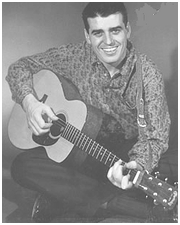There have been a lot of musical siblings through the years and some of them immediately come to mind, but it’s difficult to imagine a group of brothers and sisters quite like the Dinnings. Over a period of several decades, they covered just about every aspect of music; including songwriting, bandleading, recording, and performing on stage and screen. And those doing the performing included a popular all-girl singing group and a young crooner who thrilled teens with a chart-topping hit that was banned in Great Britain. (And if that wasn’t enough, the family’s next generation included a member of a popular modern rock group — but more later about that.)
Of course, there were nine Dinning siblings so that gave them a leg up but it’s still a fascinating story, one that began with a musical childhood in Oklahoma encouraged by their father, the musical director of a church. As the older siblings began to reach adulthood it didn’t take long for them to start making their mark, beginning with brother Ace Dinning, who found some success in the 1930s as a songwriter and  sax-playing bandleader. One of his compositions, “Don’t You Remember,” would later be a good seller for both Dean Martin and Nat King Cole, but Ace’s biggest contribution to the family’s musical fortunes was probably providing a place for his singing sisters to begin their careers.
sax-playing bandleader. One of his compositions, “Don’t You Remember,” would later be a good seller for both Dean Martin and Nat King Cole, but Ace’s biggest contribution to the family’s musical fortunes was probably providing a place for his singing sisters to begin their careers.
The Dinning Sisters, consisting of twins Jean and Ginger along with Lou, were able to use their experience with Ace’s band as a stepping stone to Herbie Holmes’ group, and from there to NBC radio. In the years leading up to World War II they became very popular radio stars, and during the war they appeared with Ozzie Nelson’s orchestra in a Hollywood film. By the time the war ended they were ready to hit the recording studio, and their debut album stayed on the charts for months. Things were going well but the following year Lou left to get married and try her hand at a solo career. The trio kept right on performing, with replacement Jayne Bundesen doing the honors until she was later replaced by another Dinning sister, Tootsie.
The Dinning Sisters continued to do well in the post-war years, with good-selling records on songs like “The Way You Look Tonight,” “Once In A While,” and their biggest, “Buttons And Bows.” It was introduced in the Bob Hope movie, Paleface, and even though Dinah Shore had the most popular version, the Dinning Sisters’ record still made the top ten on the charts.
Over the next decade the sisters continued to prosper, even appearing on records with Bob Crosby, Tennessee Ernie Ford, and Tex Ritter. But even though marriage and their own growing families, along with occasional solo efforts, began to take the sisters’ time away from the trio, they continued to be involved in music in one way or another.
Of all the sisters, Jean was probably the most multi-talented, and in the late 1950s she began to sharpen her songwriting skills. She came up  with a song for younger brother Mark Dinning, who was trying to build a singing career. Mark leaned a little closer to country music than his older siblings, but his voice and singing style was reminiscent of Roy Orbison, and he was well suited to his sister’s song, “Teen Angel.”
with a song for younger brother Mark Dinning, who was trying to build a singing career. Mark leaned a little closer to country music than his older siblings, but his voice and singing style was reminiscent of Roy Orbison, and he was well suited to his sister’s song, “Teen Angel.”
Depending on your point of view, the song was either sad and moving or sappy and morbid, but it didn’t matter to teenagers because they bought so many records that it shot up to number one on the U.S. charts. It even made a ripple in Great Britain, although it was banned by the BBC because of the subject matter.
Unfortunately, Mark was unable to duplicate the level of success reached by the song, and within a few years he’d faded from sight. He died young in 1986, but the Dinning family was far from finished. It wasn’t long before his nephew, bassist Dean Dinning, was helping found the alternative rock group, Toad the Wet Sprocket.
But the earlier generation wasn’t quite finished either, and again it was original sister Jean acting as the catalyst. In the 1990s she helped kick-start a rebirth of the Dinning Sisters with an emphasis on spirituals, working with the Jordanaires (Elvis Presley’s original backing group).
The Dinning siblings — in fact, the entire family — an amazing musical story.

